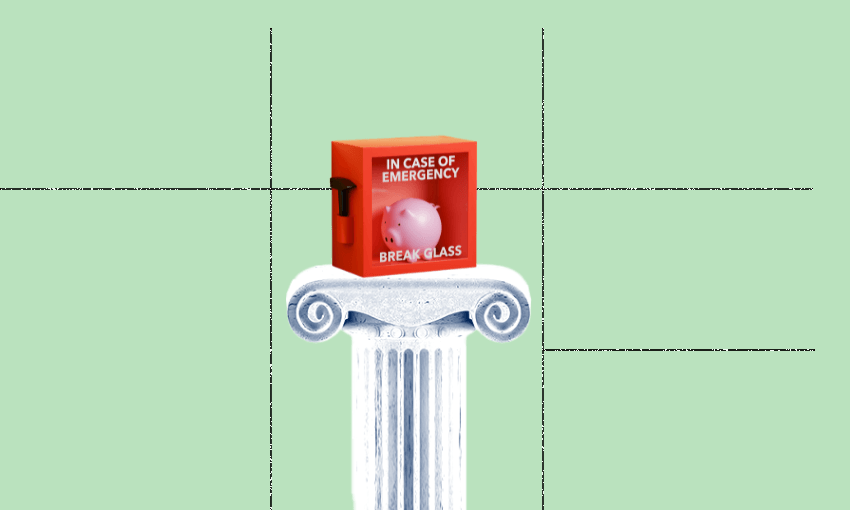The impact of the cost of living crisis on New Zealanders’ savings has been highlighted by new research that reveals the extent to which we’re living paycheck to paycheck.
For the past two years, stories of the cost of living crisis have shown the impact of rising costs, rising unemployment and rising interest rates. Few have disputed the existence of financial strain across the country, but a new survey suggests New Zealanders are feeling ever more stretched.
Almost two thirds of respondents to a nationally representative survey of just over a thousand adults said they were struggling to put money aside for saving. The results of the Talbot Mills survey, commissioned by Kiwibank and carried out at the end of May, include some stark revelations on how vulnerable many people are to financial shocks.
An unexpected $500 bill would derail one in three…
It’s a familiar scenario – surprise car repairs, an unwelcome vet bill or long-delayed and now increasingly urgent dental work that stretches your budget to breaking point. According to the survey, 30% of us wouldn’t have enough in our accounts to cover an unexpected $500 bill without borrowing it, selling something or putting it on a credit card (67% said they would be able to, with 3% unsure). Asked if they had any funds specifically set aside for emergencies, 37% said no, with 78% of those saying this was because they didn’t have the money spare.
This survey doesn’t indicate whether financial precariousness is increasing, but last year, a study by the Financial Services Council suggested it was. Almost 40% of people surveyed said they wouldn’t be able to stump up $5,000 in a hurry without going into debt, up 5% on the previous year.
… and they’re more likely to be younger, Māori and Pasifika and renters
Older respondents to the Kiwibank survey were more likely to have the cash in hand, with 79% of 60+ respondents and 72% of those aged between 45 and 59 saying they would have enough in their accounts to cover the $500 expense. The under-30 and 30-44 cohorts were much lower, with 58% and 59% respectively saying they’d have the savings.
Māori and Pasifika were less likely to be able to cover the bill, with 53% of Māori and just 38% of Pasifika saying they’d have enough in their accounts, compared to 67% across the board. That’s 62% of Pasifika not able or not certain they could cover a $500 bill.
Renters feel they’re hit by surprise bills more often
Only 51% of renters said they could cover the $500 expense, compared to 91% of those who owned their home outright and 73% of people with mortgages. Renters were more likely to be feeling the pinch in general, with 42% saying they were hit by unexpected expenses at least once a month, compared to 34% of all surveyed. The 18-44 groups felt they were lumped with surprise bills more often (44% saying at least once a month) than older people.
Over a quarter of Māori and Pasifika don’t have any savings
Asked about their current approach to saving, 41% of respondents said they regularly put money aside, with almost as many (38%) doing so from time to time when they’re able. Concerningly, 15% had no savings and weren’t contributing to any, with the figure higher among Māori (26%) and Pasifika (27%). In other words, a quarter of Māori and Pasifika have no money leftover whatsoever at the end of each pay cycle.
Those who are saving aren’t saving much, and most of us are struggling
Of those who said they regularly or occasionally put money aside, 39% were saving less than $100 a month, or $25 a week. Asked if they ever struggled to put money into savings, 77% of survey respondents agreed, with more women (69%) than men (57%). In terms of accessible savings, 34% of respondents had less than $2,000, with that number rising to 58% for Pasifika and 47% of Māori.
What does this mean for the future?
Kiwibank’s advice on emergency funds aligns with the general rule of thumb: that three months’ worth of expenses (think rent/mortgage, food, petrol, insurance) is a safe amount to aim for in case of sudden loss of income or emergency. With 34% of people having less than $2,000 in savings, that’s closer to three weeks of expenses than three months.
About 50% of homeowners are expected to refix their mortgages at higher rates this year, while rents continue their decades-long trend of always rising. Economists have predicted a drop in household spending as workers continue to feel the pinch of increasing costs across the board.
Today’s survey results suggest New Zealanders are finding it increasingly difficult to get ahead, with making it to next payday being tough enough.



